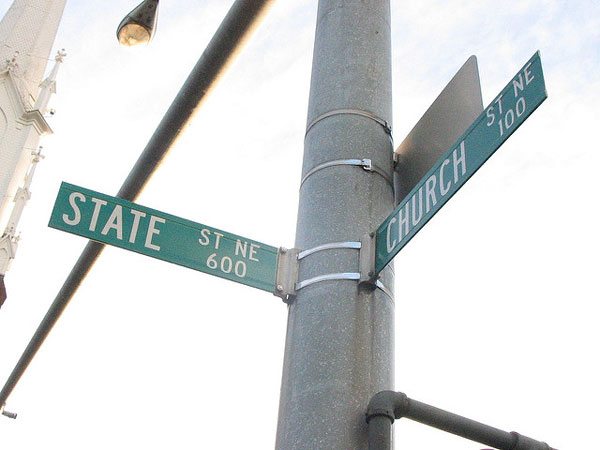
September 9, 2017; Associated Press (Washington Post), Houston Chronicle, and Jerusalem Post
What do issues of historic preservation, hurricane recovery, and playground safety have in common? All are, or have been, at the center of court cases and arguments around separation of church and state.
In the already settled playground case covered by NPQ, the issue of playground safety and whether or not a church preschool could receive state-distributed ground cover made its way to the Supreme Court. That 7-to-2 decision (Trinity Lutheran v. Missouri) in favor of the church further blurs the line between religious practice and state function. Two additional cases, each of which pushes the issue of using public funds for religious institutions, now make their way through the courts.
In Massachusetts, the Acton Congregational Church is seeking public funds for the preservation of stained glass windows in its historic church. Residents of the town of Acton are opposing this grant, based on the state constitution that limits taxpayer-funded grants to $100,000. Town leaders are urging the state Supreme Court to uphold a lower court ruling that support the grants on the grounds that it is supporting the preservation of a historic structure, not furthering a religious purpose.
“Whether a historic resource is owned by the Town, a religious institution, a non-profit or another private party, the ravages of time are equally destructive, the need for protection is equally compelling the irreplaceable loss would be equally unforgiving,” a lawyer for the town said in its brief.
Opposing this expenditure of public funds on behalf of local citizens is the American Civil Liberties Union on the grounds that local tax dollars should not be used for religious purposes. “Acton citizens may choose to support (or not support) the Church here, or any other house or worship, through personal contributions of money or other resources. The Town may not make that choice for them,” an attorney for the residents said in their brief.
In this case, precedent may be on the side of the church, as more than 300 projects involving religious institutions have already been funded through the Community Preservation Act. The outcome will rest with higher courts and could turn on whether the religious purpose of the institution becomes an important factor.
In the case of recovery and rebuilding of churches from hurricane damage, religious purpose will also be a critical issue and have reverberations for faith-based nonprofits. Immediately following the damage of Hurricane Harvey, three small Texas churches have filed a lawsuit against the Federal Emergency Management Agency (FEMA) seeking access to relief funding that is available to nonprofits but denied to religious institutions. Their suit cites the precedent of the Supreme Court decision handed down this spring in the Missouri playground case.
Nonprofits that have sustained damage from Harvey have 30 days to apply for emergency cleanup grants. FEMA rejected requests for funding of religious institutions after hurricanes Katrina and Sandy. The question of whether, under the current administration, religious organizations’ requests will be received differently is at the heart of this lawsuit. The Department of Justice has indicated that they are aware of the suit and will give it consideration. President Trump tweeted his support for the churches suit, adding to the controversy.
Sign up for our free newsletters
Subscribe to NPQ's newsletters to have our top stories delivered directly to your inbox.
By signing up, you agree to our privacy policy and terms of use, and to receive messages from NPQ and our partners.
“The churches are not seeking special treatment; they are seeking a fair shake,” the lawsuit reads. “And they need to know now whether they have any hope of counting on FEMA or whether they will continue to be excluded entirely from these FEMA programs. If the Churches were to cease all religious activity in their houses of worship, those buildings would become assistance-eligible.”
FEMA excludes buildings that provide “critical service” or “essential government services” from repair if more than half their space is used for religious programming. Exceptions have been made, but how FEMA, under the Trump administration will respond, remains an open question.
The Houston Chronicle reported both sides’ perspectives. Diana Verm represents the churches through Becket, a Washington, D.C., nonprofit firm that specializes in religious liberty cases. “In the past,” she said, “FEMA has issued disaster aid to an octopus research center, a botanical garden and community centers that offer sewing classes and stamp-collecting clubs. It’s unfair for religious groups that provide community services to be excluded from government aid when their institutions are harmed by acts of God.”
David Coale, an appellate lawyer who handles constitutional cases at a firm in Dallas, said the three churches’ complaint goes a step farther than previous cases by moving beyond exterior structures and building repairs into providing personal services.
“On its face it’s a reasonable request—it’s a disaster and they need all the help they can get,” Coale said. “On the other hand, we are talking about giving people money to offer a place to sleep. There is stuff up in the church about religion and there will be people in the church providing a little bit of ministry.”
He said one side will offer a compelling claim the agency is in crisis and needs help. Others will argue the case is about helping people who wouldn’t otherwise enter a church.
This issue is not exclusive to Christian churches. Jewish groups are taking opposing sides on whether the devastation of Jewish institutions from Hurricane Harvey should make them eligible for FEMA funds. Groups on the Jewish right, led by the Orthodox Union, have been lobbying the government for a change in the exclusion of houses of worship. They are being met with opposition from the Jewish left, who are coordinating with interfaith coalitions to keep taxpayer funds from supporting religious organizations.
“FEMA, like the rest of the federal government, is prevented by the First Amendment from steering taxpayer funds to houses of worship. While there is an understandable temptation to provide public funds to houses of worship in the aftermath of a natural disaster, it’s a temptation we must resist,” Rabbi Jack Moline, president of the Interfaith Alliance, said in a statement. “The underpinning of religious liberty in America is the separation of church and state. Steering public funds to houses of worship clearly violates constitutional boundaries between the two and would open the door to government interference in the affairs of houses of worship.”
As Hurricane Irma pummels Florida and other parts of the country, these suits from religious institutions may only be the tip of the iceberg. Religious institutions with nonprofit status have become major providers of social services as a part of their religious missions. Is the use of public dollars to restore buildings in which services that often have a religious overlay are provided a violation of the separation of church and state? Or does the universality of natural disasters and the desire for historic preservation call for an exception?—Carole Levine











